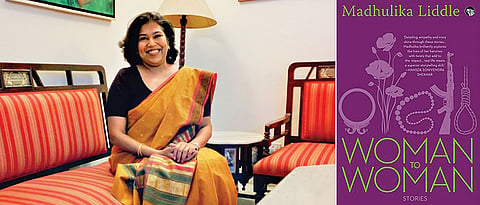

A woman and her brother try to come to terms with the knowledge of their mother’s infidelity, a family is ruined and their daughter is sold off to an unseen bridegroom in faraway land. In the heart of rural India, a lonely old woman notices the stark difference between her privileged life and that of the poor around her. Woman to Woman by Madhulika Liddle is full of such stories of women hidden in some dark corners of our ordinary lives. She tells us what went into writing such sensitive tales...
How did the book come about?
This was a culmination of more than 10 years of writing. I think of myself primarily as a writer of short stories; the short form is my forte. And ever since I’ve begun writing, a lot of my stories have featured women protagonists. Over the past couple of years, I’d been wanting to compile my women-centric short stories into one book, and was lucky that Speaking Tiger (Publishing House) thought it was a good idea too. A few of the stories in Woman to Woman have been published earlier, but the majority of them were either unpublished or written specifically for this book when we agreed on its publication.
It has stories of women across age groups. What was the inspiration behind these?
I drew inspiration from different sources. Some characters and their stories are based, to an extent, on people I either know or know of (two of the stories, for example, are based on anecdotes my mother told me about some of our relatives). Some are based on my own observations and experiences. ‘Poppies in the Snow’ arose out of my love for Kashmir, and my reading of Manisha Sobhrajani’s book The Land I Dream Of, about the untold stories of the women of Kashmir. And ‘Paro’ is largely a fictionalised account of a typical trafficked bride: I met several of these women and listened to the harrowing stories of their lives while on a visit to the area with a German journalist who was researching for a book. A few were inspired by newspaper articles.
How did you manage to balance sensitivity and bold writing?
The sensitivity comes from empathy, and that arises out of the fact that I only write about things, people and situations that move me deeply. When I feel so emotionally connected to a situation or a person, it is easy to try to put myself in their shoes and see the world from their point of view. The boldness stems from my need to tell a story. In Woman to Woman, a lot of the stories are, sadly, stories of anger and anguish, of victimisation in different ways — and in all of these, the most hard-hitting way is, I feel, the most effective. You can’t write prettily about issues like rape or bride trafficking: bluntness is needed.
What were your challenges in penning down these short stories, given the sensitivity of the subjects involved?
Looking back at these stories, I’d say the greatest challenge was to be balanced. In stories like this, the urge to reveal the pain a character is going through can sometimes go out of control, and you may end up with a character who has lost control of her life, who is now the very image of despair and dejection. Although I did allow some of my characters to show that aspect too — for instance, in ‘Maplewood’, I wanted to focus equally on women who show spirit, who somehow fight back. Injecting that spirit without it appearing too obvious and contrived was a challenge.
What according to you is a woman? What symbolises femininity?
I dislike getting into the realm of definitions. As long as she has the XX chromosomes (and I’m sure there are transgenders who have the XY chromosome but still identify as female!) — she’s a woman. That basic scientific definition is enough, because for me a woman can look, behave, and be whatever she wants (which doesn’t always happen, considering the extremely patriarchal society in which we live). What she wears, what profession (or not) she follows, what her relationships are: all of these, and the hundreds of other superficial characteristics society tends to expect of women, are just that: superficial.
‘Femininity’, likewise, for me has no real definition and no real meaning in life: it’s just a term that reinforces gender stereotypes. Why should we think of jewellery or the colour pink, or being a demure bahu, as being the epitome of ‘feminine’? Or, conversely, of a lack of makeup, of driving autos and being single, as being somehow masculine? I know it will take society — not just in India, but across the world — perhaps forever to get over these stereotypes, but I wish we could get rid of them. Perhaps freedom is the essence of femininity.
Are you a feminist? Why?
Yes, I am a feminist. I am also what I call an ‘underdog-ist’: I am always rooting for the person or the cause that is being trampled unfairly under the more powerful. As much as I speak up for women, I also speak up for those who are victims of racism, casteism, communal biases, and all other forms of divisiveness that exist in this world.
Why am I like this? Because I feel very strongly against injustice of any kind, but especially against those who have little or no means of speaking up for themselves.
What next?
Currently, I’m working on a four-book series of historical novels. These are the stories about interconnected families, told across a span of 800 years of history in Delhi, beginning in 1188 CE and ending with the Partition.
